- Home
- Jacob Peppers
A Sellsword's Hope Page 3
A Sellsword's Hope Read online
Page 3
Adina nodded slowly. Perhaps evil does destroy itself, she thought, but will any of us be around to see it? And on the back of that thought came another: You are enough.
She stared at the sellsword shifting restlessly in the bed, watched his features twist slightly in anger, as if reacting to the dark phantoms that plagued his dreams. It was strange, she thought, that so much of her hope for Telrear and its people, for winning the coming battle, was wrapped up in the sellsword—a man who, not so very long ago, professed to care nothing for anyone but himself and the coin he earned. But if it was a strangeness, then it was not hers alone. She’d seen the way the guards and soldiers studied Aaron, as if he was some god come to set things right. Not just her strangeness, not just her hope, but everyone’s.
It wasn’t fair to put so much of the burden on his shoulders, she knew, yet she could not keep herself from it. The world stood poised before an onrushing landslide, and it would have long since been buried had the sellsword not interposed himself between it and the coming danger. Even now, he strained against that unimaginable weight, felt the pressure of it. And as he shifted in his sleep, the hope of the world and all of its people shifted with him.
He is only one man, she told herself. How can one man—even one such as Aaron—think to stand up against what is coming? He couldn’t—that was the truth of it. Alone, a man was vulnerable, could be defeated. But legends, on the other hand, were more than the men and women from whom they originated. Legends were ideas, and ideas, she knew, were not so easily destroyed. If nothing else, Grinner’s treachery had taught her that much. “How many men does Urek now command, Gryle?” she asked, her eyes never leaving the sellsword.
“I…that is, I cannot say for certain, Princess, as I have not seen the latest counts. Every day, it seems, more come to him to offer their…services.”
He said the last with a disdain that Adina understood, for those who came to Urek were criminals all, men and women who fed off civilized society like vultures. Men and women who, in a perfect world, would be thrown in the dungeons, forced to answer for their crimes. But the world was what it was, far from perfect, far from ideal, and wishing would not change it. She frowned as a plan crystallized in her mind, one she knew Aaron would not like. But then, he and the others had chosen her as their leader, and lead she would.
“Gryle,” she said, turning to the chamberlain. “After the meeting, I wish to speak to Urek. Tell him that I will want an exact count of how many men and women he has under his…command. I have a mission for them.”
The heavy-set man raised an eyebrow in surprise. “Forgive me, Princess Adina, for I do not mean to question you but…whatever task you have, are you sure we cannot find those you need somewhere else? From the army, perhaps, or—”
“No,” Adina said, shaking her head. “I am sure. This task, I believe, is particularly suited to Urek and his men’s…talents.”
The chamberlain frowned at that, not bothering to hide his doubt. “Talents, Majesty?”
Adina laughed quietly. “Yes, Gryle. I know you don’t appreciate what they do, and I can’t blame you. After all, they’re criminals. In normal times, I wouldn’t trust them either. But then, these are not normal times. In the city’s taverns and brothels, in its shops and streets, the people talk of what’s coming, and most of that talk is without hope. We cannot blame them, really, for given what has happened recently—Grinner’s betrayal—is it any surprise that they have lost some faith in their leaders to see them through the approaching storm?”
“No,” Gryle said slowly, “you’re right, of course, Majesty. But I’m not sure how criminals will be able to help that.”
“Aren’t you?” Adina asked. “There is power in belief, Gryle—Grinner’s men have taught us that much, if nothing else. But belief must first begin with something to believe in, an idea. We cannot stop the whispers, the rumors that are passed among not just the city but the army as well. But what we can do is give them something, someone to talk about. A living, breathing legend. Kevlane and his creatures are like monsters out of a child’s storybook, an army of evil come to plague the world. And what else do all such story books have in common?”
“A knight,” the chamberlain said, his eyes going wide with dawning realization. “I see. But, forgive me, Queen,” he continued, his expression growing troubled, “but Mr.—pardon, General Envelar—would laugh to be thought of as anyone’s knight. I suspect, in such a tale, he would cast himself as the villain before he would the hero.”
Adina gave a nod of her own. “Perhaps, you’re right, but he would be wrong, and I think we both know it.”
“Of course, Majesty,” Gryle said slowly, considering. “He won’t thank us for it.”
“No,” Adina said, “he won’t.” And when the time comes, I won’t ask for his thanks—only his forgiveness.
“Very well, Majesty. I will tell Urek you will have need of his men. How many should I ask for?”
Adina gave the chamberlain a small, humorless smile. “All of them, Gryle. The army will march soon, and if I have any say, when it does, it will have a legend to lead it.” It would be no great trouble, she thought, to turn the man who many already thought of as a hero into a legend, and though she hated how Aaron put himself at risk, such stories would only add to the legend, were food with which to feed it.
“Very good, Majesty. For what it’s worth, I believe that—whatever his own thoughts on the matter—Perennia could ask for no better knight than Aaron, the man who saved it not only from an assassination attempt on its queen, but also from Grinner’s machinations. As for the meeting…Captain Gant sent word not long before we came here, and the messenger conveyed an unmistakable sense of urgency for your presence.”
Adina smiled, surprised as always by the chamberlain’s modesty. Aaron had indeed been instrumental in rescuing Perennia, but Gryle had played no small part himself. She suspected that without him, the city’s fate would have been sealed already. Another thought struck her then, and her smile widened. One legend was good, a symbol which the city might gather behind, a light that they might stand with as the darkness approached. But where there was one hero, surely there might be another, and she decided she would have some very particular words with Urek about what stories those in his charge told.
Then she thought of the approaching meeting, of what it might mean that they were assembled in Isabelle’s audience chamber without warning, and her smile withered. “Alright—let’s find out what’s going on.”
Gryle led the way, his eyes roaming the castle hallway as if he expected assassins to materialize from the walls, and she didn’t miss the way his fists were clenched at his sides. Adina spared one final glance for Aaron, and she let out a soft sigh. “Forgive me,” she whispered. “I’m afraid that I have just made the weight you carry a little heavier, but please, hold on. Just for a little while longer.”
Her own fears, her own doubts, gathered around her, forcing their way into her thoughts, but she pushed them down as she turned and followed Gryle. The city, the world, had no use for her worries—they needed a leader. And she would be that for them, just as Aaron would be their hope. You are enough, she told herself, but the words felt as insubstantial as mist.
***
The meeting had already begun by the time Adina and Gryle arrived, though calling it a “meeting” might have been generous. It didn’t seem like a meeting of a council of allies at all, but a shouting match, and the voices of those gathered were so loud she could not even hear the door shutting behind her.
General Yalleck, the commander of Avarest’s armies, sat on one side of the room, a vaguely troubled expression on his face. Farther down the table sat a man Adina didn’t recognize, an officious-looking sort in silk trousers and shirt that would have cost more than most commoners made in a year. The man was flanked on either side by his servants. Another man sat at the end of the table, the quill and parchment in front of him marking him as a scribe, come to record the proceedings
.
Isabelle sat in her throne in the center of the room, and the table opposite Yalleck and the newcomers was taken by Captain Gant alone. Not that he was sitting at it, just then. The captain stood facing the others, his normally calm demeanor nowhere in evidence. His face had gone a deep, angry shade of red. His eyes were locked on the newcomer, and his hands were clenched into fists at his side, trembling as if it was all he could do to keep from attacking the man outright.
“—Damned fool decision is what it is!” Brandon roared. “You can pretty it up with whatever words you want, but that doesn’t change it!”
He was clearly addressing the finely-dressed man, but if the newcomer was bothered by the captain’s anger, he gave no sign. Instead, he favored the captain with an arrogant smile, raising his hands to indicate that whatever decision Brandon spoke of was beyond his control.
“Forgive me, Captain,” the man said in a tone that did nothing to hide his evident pleasure at Brandon’s outburst, “but the decision has been made already, and I could not change it, even if I wished to.”
“Then you doom us all!” the captain shouted. “You would leave us to die on our own, as if it means nothing to you.”
The man shook his head, his humoring smile fixed well in place. “Of course not. The Council, after all, holds nothing but the highest esteem for Queen Isabelle and her realms.” He paused, taking a moment to give a deferential nod to Adina’s sister. For her part, Isabelle didn’t even seem to notice—her expression was blank, or nearly so, the only emotions that showed on it a vague sort of confusion mixed with fear, as if she wasn’t sure where she was or what was expected of her. She had been in such a state since Adina and the others had returned and taken the city back from Grinner, and neither Adina nor any of Perennia’s healers had been able to rouse her from it. She had once been a proud, confident—if vain—queen, but no longer. The woman, the sister Adina knew, was gone. In her place was a sickly creature whose skin hung from her in folds, her eyes sunken pits in her face, and a distinct yellow tinge to her skin Adina didn’t like.
“But despite the highest regard in which I—and the rest of Avarest’s Council—holds Her Majesty and her domain,” the stranger went on, “the choice has been made. Though, if it helps, Captain,” he said, turning back to Brandon, “the decision was not made lightly.”
The captain turned away from the queen, his disappointment clear in his expression. “Something to carve on your tombstone then,” he spat. “A murderer, a coward, but at least he didn’t make the decision lightly.”
The stranger sighed, picking at an invisible piece of dust on his sleeve. “Truly, Captain, there is no need for this melodrama. It is quite crass and demeaning for a man of your station. Take heart for, as ever, our lives are in the hands of the gods. Was it not Platorus, the great scholar, who wrote ‘the endeavors of man are like the crafting of sand castles on the shore, and should such ramparts stand it will not be by the labors of those who fashioned them, but by the hands of the gods who ever hold the grim tides at bay’?”
“Actually, it’s ‘sweeping tides’ and that wasn’t Platorus,” Adina said, “but Ivangian. You were close—only a few centuries off.” Those gathered turned, noting her and the chamberlain for the first time. The man who’d spoken frowned, but the captain’s face lit up with hope.
“Queen Adina,” Brandon said, bowing his head, undisguised relief in his voice. “I am so glad you could make it.”
Adina gave the captain a smile and turned back to the other man. “Also, you left out the end of the quote: ‘The endeavors of men are like the crafting of sand castles on the shore, and should such ramparts stand, it will not be by the labors of those who fashioned them, but by the hands of the gods who ever hold the sweeping tides at bay. Yet, such truth does not make the works of men without purpose, for such edifices as they create shape the face of the world.”
The newcomer fidgeted uncomfortably, his expression looking as if he had swallowed something sour, but it was gone in a moment, replaced with one of affected insouciance. “Queen Adina,” he said, bowing his head but not, she noted, bothering to stand which would be proper when addressing a queen. Gryle’s sudden tensing at her side showed her that he, too, had noticed the impropriety. “I have heard some tale of your exploits in the past months and even given what were no doubt exaggerations as so often come from stories told and told often, I must commend you on your defense of the city against your brother’s armies.” The stranger smiled, like a humoring parent praising a particularly clever child. “A feat, I’m sure, of which you are most proud.”
“Forgive me,” Adina said, holding up a hand to silence the captain who looked as if he would start shouting anew at the man’s obvious show of disrespect, “but I’m afraid I didn’t get your name.”
The newcomer gave a small chuckle, glancing at one of his servants as if amused that anyone should be so far removed from the workings of power as not to know him. “No offense is taken, of course, Majesty. I suspect you have been too busy with your travels and various…exploits, to stay apprised of world events. My name is Faden Arkrest, a councilman of some small influence in Avarest.” He paused there, another small, knowing smile coming to his face as if to underline his own humility. “And I have the distinct pleasure of being chosen as the representative of the Council of Avarest and its will, entrusted with the duty of communicating its decisions regarding the disposition of its forces within the city, and, if given just cause, to change them.”
The old Adina would have felt fear at the man’s words and the news he brought—clear enough, given his purpose for visiting Perennia and Brandon Gant’s obvious anger. But she was not the woman she once had been. She was no sheltered princess who understood little of the world, easily given to panic. Like Gryle and all the others, she had been tested over the last few months, forced to grow and become more than that shallow woman she had once been. So, she did not feel fear—only anger. “You say, Councilman, that you have heard some tales of my exploits and those others, is that right?”
“Indeed,” the man said. “Quite harrowing experiences, I’m sure, and you must be commended for managing to hold the city against Belgarin’s forces—I hope that Avarest’s own troops aided you in that. We were pleased, of course, to be of assistance in your time of need.”
An unsubtle reminder of the aid Avarest had already given them, and he said the last as if he’d personally held the gates against Belgarin’s hordes, as if he had performed some great act of charity for which Adina and all those in Perennia should be grateful. “Of course,” Adina said, keeping herself calm and refusing to rise to the man’s bait. “I, and all those who have stood and fought with me over these past weeks are not unaware of the help we have thus far received from Avarest, and we are grateful. In fact, I would say that the whole of Telrear is grateful, since it is for them we fight.”
The man smiled as if she had told a joke. “The whole of Telrear, is it? Forgive me, Majesty, for I do not mean to question what you have done, but surely it is not so serious as that. Your brother Prince Belgarin is ruthless, it is true, but it seems that a concerted effort was enough to give his army a good whipping, enough to send him and his forces slinking back to Baresh with their tails between their legs.”
Adina’s anger flared up again, but she forced it down with a will. “My brother is dead, Councilman,” she said flatly. “He has been, I suspect, for some time. As for the ‘whipping’ of which you speak, many men and women—good men and women—died defending this city and, by extension, the world. Even now, should you walk the walls, you will see proof of their sacrifice marring the ramparts, for blood, Councilman, does not clean so easily as wine.”
“Yes,” Faden said, and though he did not visibly roll his eyes, his tone made his thoughts clear enough. “I am quite sure that the warriors of Perennia fought valiantly in this…skirmish.”
“Skirmish?” Adina asked, unable to keep all the anger from her voice this time.
&n
bsp; “Well,” the man said, his tone apologetic, “surely, it must be called that, if we wish to be accurate, Majesty. After all, Belgarin’s army was beaten soundly in, what, a matter of days?” He nodded, as if to agree with himself. “Yes, a ‘skirmish’ seems accurate enough. I am, not to boast, somewhat of a scholar of war, and when this most recent scuffle is compared to some of the great battles of history, well…” He trailed off, smiling and shrugging his shoulders.
“A scholar of war,” Adina repeated.
“Quite,” the man said, inclining his head as if she’d just offered him a compliment.
“Tell me, Councilman Arkrest,” Adina said, “do you know many of history’s battles?”
Even the man’s laugh struck her as arrogant. “Majesty, such a direct question puts my humility at risk, but yes, I am well-versed in them. I would hazard to say that I am, perhaps, one of the world’s foremost scholars on the subject.”
“And have you ever fought in one?”
The man frowned, raising an eyebrow in confusion. “Forgive me, Majesty?”
“Perhaps I wasn’t clear,” Adina said, “my apologies. Let me try again: have you ever taken up your place in line as an army of men ran at you, screaming for your blood? Have you ever stood over the corpses of enemies and friends alike, so many bodies you could nearly swim in them? Have you ever listened to the sounds of the dying as they screamed for mercy, as grown men cried out for their mothers, and you stood by helpless, the smell of blood filling your nose? For blood, Councilman, does have a smell. Many people don’t realize just how strong that smell is, just how powerful.”
“No,” the man said, clearly annoyed, “I have not fought in battles, Majesty, for it is my belief that such endeavors are not well-suited to learned men. No offense, Captain,” he said, glancing at the man for a moment before turning back to her. “Still, I would hazard that such martial experience would not be a requirement to be well-learned on the subject, for a man to be a true scholar. After all, historians need not have experienced every event which they record to be masters of their subject matter.”

 A Sellsword's Hope
A Sellsword's Hope The Warriors of the Gods
The Warriors of the Gods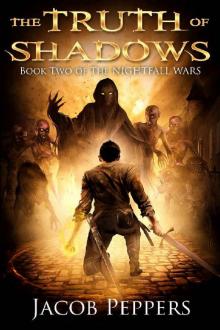 The Truth of Shadows
The Truth of Shadows A Warrior's Burden: Book One of Saga of the Known Lands
A Warrior's Burden: Book One of Saga of the Known Lands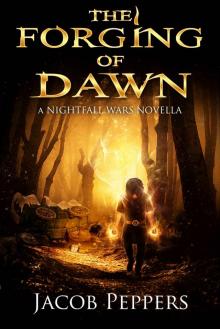 The Forging of Dawn
The Forging of Dawn A Sellsword's Mercy
A Sellsword's Mercy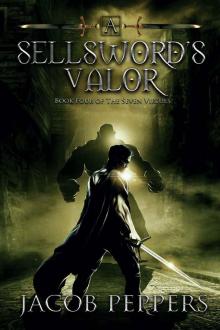 A Sellsword's Valor
A Sellsword's Valor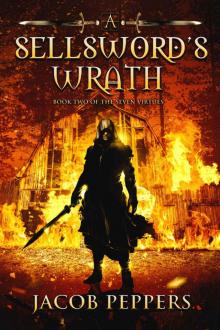 A Sellsword's Wrath
A Sellsword's Wrath A Sellsword's Compassion_Book One of the Seven Virtues
A Sellsword's Compassion_Book One of the Seven Virtues The Silent Blade: A Seven Virtues Novella
The Silent Blade: A Seven Virtues Novella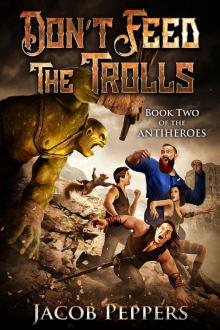 Don't Feed the Trolls
Don't Feed the Trolls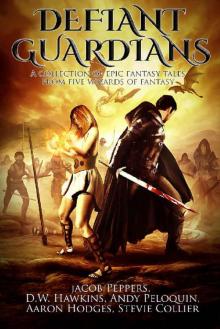 Defiant Guardians Anthology
Defiant Guardians Anthology The Silent Blade
The Silent Blade Reaper's Awakening
Reaper's Awakening